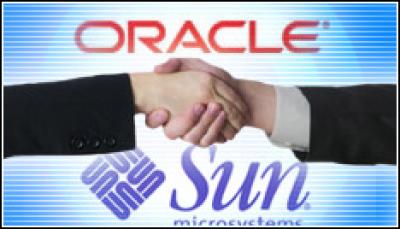Sun Team Take Stage At Oracle Conference

The two companies kicked off their first joint Oracle OpenWorld conference by announcing an intriguing new flash-based storage system and re-identifying “The Giant” — as Oracle founder Larry Ellison referred to IBM — as its key market target
Sun Chairman of the Board and co-founder Scott McNealy, Sun Vice President of the Systems Group John Fowler, and Vice President and Sun Fellow James Gosling represented their company on stage at Oracle OpenWorld.
Ellison took his usual jabs at IBM and made his standard “we’re way faster than they are” statements, but in this instance he ended up taking a back seat to the Sun executives in the opening presentation of a five-day conference that is expected to draw about 35,000 attendees.
Fowler, who appears to have replaced Sun CEO Jonathan Schwartz — who was nowhere in sight — as No. 2 on the company’s media-visibility chart, made the news announcement of the evening by introducing the F5100 FlashFire Storage Array, which is loaded with 80 NAND flash modules [which equates to a whopping 1.8TB of solid-state capacity] that Fowler claimed runs on only about 300 watts of power.
“This single array is comparable in speed and capacity to thousands — yes, thousands — of disks,” Fowler said. “This new storage system will have four times the throughput as anything comparable on disk, yet cut power use by about one-fourth.”
Fowler didn’t offer a lot of details about the F5100 — including the pricing, which undoubtedly will also be impressive. But solid-state is the way storage is quickly moving, and this new machine promises to be the biggest and most powerful SSD storage array the world has seen to date.
McNealy and Ellison both defended Oracle from recent statements by IBM and Hewlett-Packard, whose advertising has tried to create doubt in the marketplace that Oracle will continue to invest in Sun’s SPARC chips, Solaris operating system, the MySQL database, and StorageTek franchises.
“If Oracle messes with it, the world will fork,” McNealy said, referring to all of Sun’s intellectual capital.
Ellison, who spoke for the last 20 minutes of the opening keynote, reiterated his stance that Oracle will continue to invest “even more than Sun itself did” in the hardware and software developed by the company that brought Java and “the network is the computer” to the world.
“It’s dazzling to think of all the innovations that have come from Sun over the last couple of decades,” Ellison said. “It’s no wonder that Scott is so filled with pride when he talks about the company he founded and all it has delivered to the computer industry.
“I think it’s exciting that we can take this great company, Sun, and combine it with another great company, Oracle, and merge those technologies — and maybe do things that neither company could do by themselves.”
Ellison talked a bit about the recent reprimand he and his company received from the TPC Transaction Processing Performance Council, a nonprofit that checks on claims made in advertising that involve benchmarks for IT products. The TPC’s TPC-C benchmark is an often-used standard for comparing online transaction processing performance on various hardware and software configurations.
The TPC requires that claims based on TPC benchmarks must be demonstrable using publicly available data from official TPC benchmark results.
Oracle contended in a series of advertisements that its database server running on SPARC chips and on Solaris is faster than one from IBM using a benchmark result it claimed will be announced on 14 Oct. “This is not supported because Oracle did not have a TPC result at the time of publication,” the TPC said on Sept. 30, when the TPC announced that it had fined Oracle $10,000 (£6345) for the yet-to-be substantitated claim.
“Right after we announced the merger,” Ellison said, “IBM started going to Sun customers and said, ‘Well, you know, Oracle’s going to get out of the hardware business. They’re not going to invest in Solaris. They’re not going to invest in SPARC. They don’t care about that — they’re a software company. As a Sun customer, can you deal with this kind of uncertainty?’ ”
“We felt we had to respond. And we made a series of commitments [in advertisements]. First we said, ‘We are not selling the hardware business — no part of the hardware business. We think SPARC is a fantastic technology, and we think with a little more investment it can be even better.”
Ellison then said that is why his company ran the benchmark ad. “We knew it was a little out there, but we thought it was important. We figured, ‘Well, it cost us ten grand.’ But we will be running the ads again soon, and now everything is on the right time line,” he said.
Ellison also expressed specific support for every major Sun and Sun-sponsored product.
“We also think that MySQL is a fantastic piece of technology, it’s extremely popular, it’s an open source product, and we’re going to increase our rate of contribution to that product. We feel that if we can make it better, we might be able to make a little money along the way,” Ellison said. Open source database company Ingres has claimed to be gaining form an exodus of users from MySQL.

Ellison poked fun at IBM several times during the keynote, but the one statement that might have hit home the most involved a reference to Big Blue’s well-publicized Smarter Planet initiative.
“We’re in it to win it. We’re looking forward to competing with IBM in the systems business,” Ellison said. “We think the combination of Sun and Oracle is well-equipped to compete successfully against the giant.
“We’re not trying to make a smarter planet here — we’re trying to make smarter computers.”